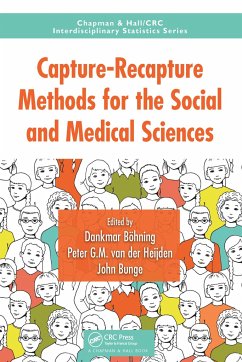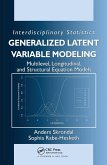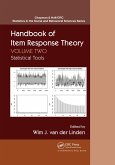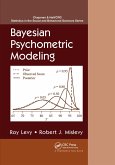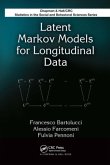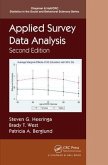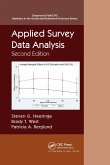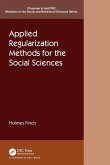Capture-recapture methods have been used in biology and ecology for more than 100 years. However, it is only recently that these methods have become popular in the social and medical sciences to estimate the size of elusive populations such as illegal immigrants, illicit drug users, or people with a drinking problem. Capture-Recapture Methods for the Social and Medical Sciences brings together important developments which allow the application of these methods. It has contributions from more than 40 researchers, and is divided into eight parts, including topics such as ratio regression models, capture-recapture meta-analysis, extensions of single and multiple source models, latent variable models and Bayesian approaches.
The book is suitable for everyone who is interested in applying capture-recapture methods in the social and medical sciences. Furthermore, it is also of interest to those working with capture-recapture methods in biology and ecology, as there are some important developments covered in the book that also apply to these classical application areas.
The book is suitable for everyone who is interested in applying capture-recapture methods in the social and medical sciences. Furthermore, it is also of interest to those working with capture-recapture methods in biology and ecology, as there are some important developments covered in the book that also apply to these classical application areas.
"This is a timely, important book on the use of capture-recapture methods for social and medical data. ... Several books have been written on capture-recapture methods for ecology, over many years, and one focussing on social and medical applications has been long overdue. ... This book illustrates the power of appropriate capture-recapture analyses in areas other than ecology. Several of the book chapters describe new methods, and suggest avenues for future research. ... The relevance of the methods described is evident, with applications to studies of the prevalence of scrapie, and estimating numbers of injecting drug users, of immigrants, and of victims of domestic violence, etc. Time and again we see the power of Statistics in providing answers to really important questions....
I enjoyed reading this book enormously. A great attraction is the wide range of motivating examples, complete with data, which include several from ecology. The way that methods are regularly illustrated on both real and simulated data is engrossing. Models are clearly described and accessible. The book should be required reading, for years to come, for any university course on Applied Statistical Modeling, as well as being a vital reference for research. I am sure that this book will be much read, and make a major impact."
-From the Foreword by Byron J. T. Morgan
"Capture-Recapture Methods for the Social and Medical Sciences is a much-needed text focussing on social science applications and methods of capture-recapture modelling. Theory within the field of analysis of capture-recapture data has developed in a disparate fashion between areas of applications, and many texts have focused on the presentation of ecological applications. This book does an excellent job of approaching the field from a different perspective, whilst still retaining how ecological applications fit into the developments. The book has been written by over 40 contributors, each an expert in their own area, which means that the theory presented is cutting-edge but has been presented in an accessible style...I will certainly be recommending this book to my collaborators and research students, as it provides a unique perspective, which is lacking in other capture-recapture books currently available on the market. Although this is a text that most likely will be dipped in and out of for reference to a particular topic, the book could be read cover-to-cover and anyone completing this can be sure of being up to date on the latest modelling approaches for capture-recapture data in the social sciences."
-Rachel S. McCrea, Univeristy of Kent
"Capture-Recapture Methods for the Social and Medical Sciences, edited by Böhning, van der Heijden, and Bunge is the first book explicitly centered on applications of capture-recapture methods to human populations and medical problems...The most interesting aspect of this book is the example applications. Most of them are taken from outside the classical setting of estimating animal abundance, and illustrate well the applicability of CR methods to diverse domains in social science and medicine...Capture-Recapture Methods for the Social and Medical Sciences deserves praise for being the first of its class. It is a good catalog of single-list CR methods, and contains some limited information about multi-list methods. This book can be useful for raising awareness among applied researchers of the applicability of capture-recapture methods for estimating human populations."
-Daniel Manrique-Vallier, The American Statistician, Volume 34, 2020
I enjoyed reading this book enormously. A great attraction is the wide range of motivating examples, complete with data, which include several from ecology. The way that methods are regularly illustrated on both real and simulated data is engrossing. Models are clearly described and accessible. The book should be required reading, for years to come, for any university course on Applied Statistical Modeling, as well as being a vital reference for research. I am sure that this book will be much read, and make a major impact."
-From the Foreword by Byron J. T. Morgan
"Capture-Recapture Methods for the Social and Medical Sciences is a much-needed text focussing on social science applications and methods of capture-recapture modelling. Theory within the field of analysis of capture-recapture data has developed in a disparate fashion between areas of applications, and many texts have focused on the presentation of ecological applications. This book does an excellent job of approaching the field from a different perspective, whilst still retaining how ecological applications fit into the developments. The book has been written by over 40 contributors, each an expert in their own area, which means that the theory presented is cutting-edge but has been presented in an accessible style...I will certainly be recommending this book to my collaborators and research students, as it provides a unique perspective, which is lacking in other capture-recapture books currently available on the market. Although this is a text that most likely will be dipped in and out of for reference to a particular topic, the book could be read cover-to-cover and anyone completing this can be sure of being up to date on the latest modelling approaches for capture-recapture data in the social sciences."
-Rachel S. McCrea, Univeristy of Kent
"Capture-Recapture Methods for the Social and Medical Sciences, edited by Böhning, van der Heijden, and Bunge is the first book explicitly centered on applications of capture-recapture methods to human populations and medical problems...The most interesting aspect of this book is the example applications. Most of them are taken from outside the classical setting of estimating animal abundance, and illustrate well the applicability of CR methods to diverse domains in social science and medicine...Capture-Recapture Methods for the Social and Medical Sciences deserves praise for being the first of its class. It is a good catalog of single-list CR methods, and contains some limited information about multi-list methods. This book can be useful for raising awareness among applied researchers of the applicability of capture-recapture methods for estimating human populations."
-Daniel Manrique-Vallier, The American Statistician, Volume 34, 2020

